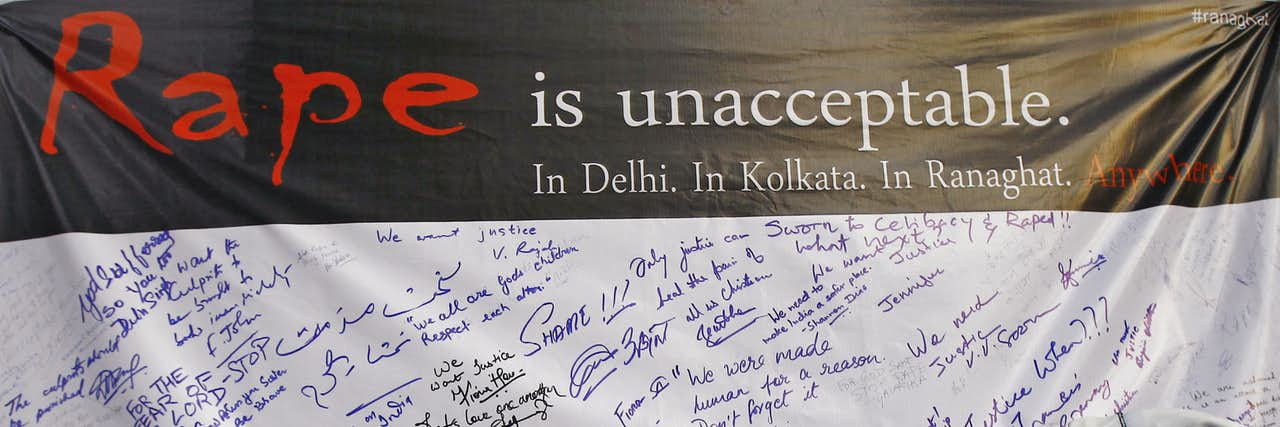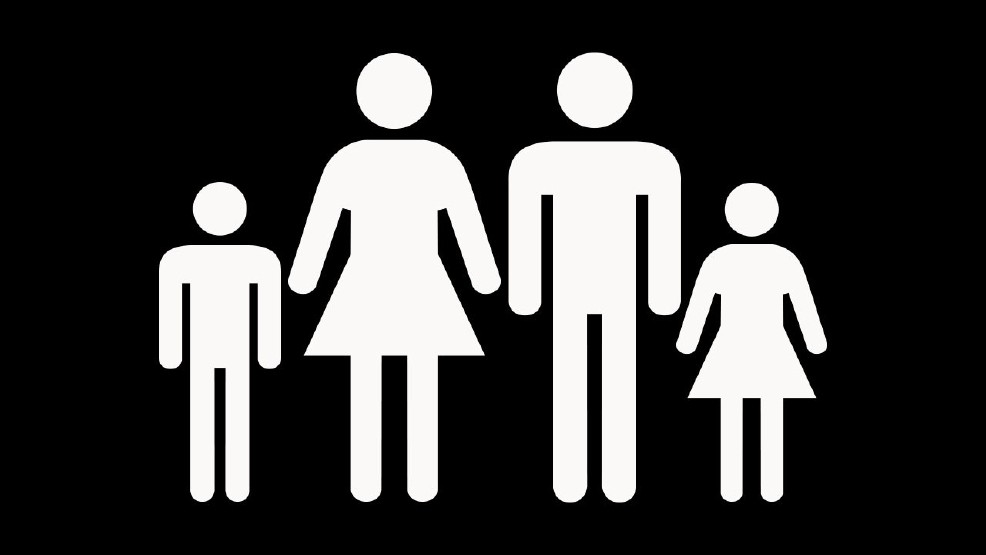The institution of marriage is above the bodily integrity of women and the Centre has proven this by defending the Supreme Court, when it stated that a man forcibly having sex with his minor wife between the age of 15 to 17 years of age, should not be regarded as rape. This exception in the rape law, the Centre said, is to ‘protect the institution of marriage’, Hindustan Times reported.
Already, marital rape is not regarded as a punishable offence in India. At best, the law protects women subjected to marital rape, by charging the husband with a minor offence of cruelty, the punishment of which goes up to three years in jail or a fine. In ‘worse cases,’ she can seek restraining order and protection under domestic violence legislation. In fact the Union Minister of Women and Child development, Maneka Gandhi, had once made an infamous volte-face on the issue when she said last year that marital “Rape cannot be applied in the Indian context“, because of factors including “Level of education and illiteracy, poverty, social customs and religious beliefs.”
Also read: Dear Mrs. Maneka Gandhi, Marital Rape Is Rape. Period
However, the complication here is that while the law on marriage recognizes a 18-year-old girl as a major and its illegal for a girl below that age to marry yet the legal status of a child marriage is voidable at the option of the parties. It is not absolutely void, though. This was done to ‘protect the interests’ of those who may enter such arrangements. However, if the consent to marry is obtained by fraud, deceit or if the child is enticed away from their lawful guardians and if the sole purpose is to use the child for trafficking or other immoral purposes, the marriage would be void.
It must be noted here that marriage law in India does not allow a woman to be legally married before the age of 18 and consensual sex with a minor outside of marriage is also considered rape by the law but not so, if the minor is married.
In a case where the government was responding to a plea filed before the court by the NGO Independent Thought, urging the court to include all minors, irrespective of marital status, under Section 375 (the section about rape in the IPC). But the Apex Court has upheld the prevailing law, wherein if a man has physical intercourse with a girl under 15 years of age, it is termed as rape irrespective of ‘consent or no consent’ and if she is below 18 years of age, but if she is above the age of 15 and married, then no offence of rape is made out.
the law states that consensual sex with a minor outside of marriage is rape – but not so if the minor is married.
Advocate Gaurav Agarwal appearing for NGO Independent Thought argued before court to raise the age of consent to 18 as he thinks that in the interest of the protection of girls to not make uninformed decisions, it would best to do have some uniformity in ascertaining the age of consent.
India’s age of consent for heterosexual sex has traditionally been 16 years except in Manipur, where it is 14. If the partners are married then a lower age of consent applies (13 in Manipur and, traditionally 15 in the rest of India). In 2013, the age of consent was raised to 18 in the IPC, for the rest of India (excluding Manipur). However, if married the age remained 15. Thus there is no uniformity, in fact it can also be said then that child marriage practiced (although illegal) are a form of institutionalized pedophilia.
The bench seemed to be wanting to defend the rights of child brides, by making a case in favour of marital rape exemption, which can be traced to statements by Sir Mathew Hale, Chief Justice in England, during the 1600s, which effectively means, “The husband cannot be guilty of a rape committed by himself upon his lawful wife, (even if so the marriage is illegal) for by their mutual matrimonial consent and contract, the wife had given herself in kind unto the husband, whom she cannot retract.”
Justice Madan B. Lokur was skeptical about how such an exception might work against the rights of those it seeks to protect and instead may serve as an incentive for people to enter into a child marriage. But the Centre’s lawyer, Binu Tamta argued in favour of giving precedence to ‘protecting the institution of marriage’. While citing that in practice there remain around 23 million child brides and if the exception of the married minor were to be revoked, then it would make the men involved more susceptible to persecution, hence ‘damaging the institution of marriage’.
So once again, to maintain the sanctity of marriage the Centre’s lawyer is willing to turn a blind eye towards the possibility that children are not capable of consenting to sexual activities with an adult; just because the child participates in this abuse does not mean that the child has consented.
child marriage practiced (although illegal) are a form of institutionalized pedophilia.
Ambivalence is a characteristic in child sexual abuse that needs to be paid attention. However, here we see that the court simply lacks the framework or the language to even grasp coercive sex within marriage, let alone be able to devise ways of preventive action where consent is not attained in black or white.
Indian Express quoted the bench to be saying, “Parliament has extensively debated the issue of marital rape and considered that it was not an offence of rape. Therefore, it cannot be considered as a criminal offence,” a bench of justices M B Lokur and Deepak Gupta said. The apex court also said that marriage of a girl, who is below the age of 15 years, was ‘illegal’.
“There are cases when college-going teens, below 18 years of age, engage in sexual activities consensually and get booked under the law. Who is going to suffer? The boy is not at fault. The punishment of seven years is too harsh”, the bench said. “Similar problems arise when a girl, under 18 years of age, elopes and engages in consensual sexual activity, thereby making the man susceptible to being booked for rape.”
To this, the NGO’s lawyer Gaurav Agrawal argued that Protection of Children from Sexual Offences Act (POCSO), 2012, provisions sit in contradiction with the IPC provision. The POCSO provision provides that physical relationship with a minor constitutes the offence of rape and it does not exclude such relationship between a man and his minor wife. According to the Tribune, the Supreme Court has admitted that the data of child brides reflects badly on the government and has given the Centre two weeks to provide data relating to the prosecution of those involved in child marriage, the number of prohibition officers appointed by states as per the Prohibition of Child Marriages Act, 2006 and medical records on the impact of such marriages on children.
Until then, we’ll have to wait and see when the question of bodily dignity of women and girls will be regarded as more important than preserving patriarchal structures of power, within and outside of institutions. One hopes that the ideal of justice will not be formulated in accord with the notion of amputating a fractured arm than treat it. If the institution of marriage is going to be considered sacrosanct in the eyes of the law, it will be so due to systematic silencing as there may be little to no legal recourse available for women to narrate their histories of abuse.
Featured Image Credit: Signatures on an anti-rape banner. The image is used for representational purposes via Reuters
About the author(s)
Avantika Tewari is a researcher and social activist based in Delhi.





What about the threat of misuse of this law if it is promulgated? We can already see men being victimized by false rape and molestation cases, not just in big cities but also in small towns. What provisions will be there to protect a man if a spiteful woman files a false case of rape against him?
This is for a minor you imbecile! Always there will be rape apologist with their “what if” arguments.
Can u mention any law that cannot be misused, or only the laws intended to protect women in some way are your actual problem?
Instead of banning sex between husband and minor wife, it would be better to declare such marriages null and void. Any Marriage complete with consumation of marriage. So, if sex doesn’t take place between spouses, the Marriage is itself incomplete, and thus no marital rights and rights that come with marriage like “right to reside in marital home” can’t be enjoyed by any spouse.